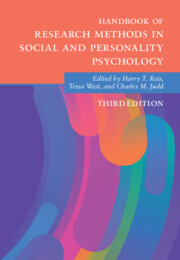Book contents
- Handbook of Research Methods in Social and Personality Psychology
- Cambridge Handbooks in Psychology
- Handbook of Research Methods in Social and Personality Psychology
- Copyright page
- Contents
- Figures
- Tables
- Contributors
- Introduction
- 1 The Romance of Research Methods
- Part I Before You Dive In
- Part II Basic Design Considerations to Know, No Matter What Your Research Is About
- 6 Research Design and Issues of Validity
- 7 Experimental Design
- 8 Quasi-Experimental Designs
- 9 Field Research Methods
- Part III Deep Dives on Methods and Tools for Testing Your Question of Interest
- Part IV Understanding What Your Data Are Telling You About Psychological Processes
- Index
- References
6 - Research Design and Issues of Validity
from Part II - Basic Design Considerations to Know, No Matter What Your Research Is About
Published online by Cambridge University Press: 12 December 2024
- Handbook of Research Methods in Social and Personality Psychology
- Cambridge Handbooks in Psychology
- Handbook of Research Methods in Social and Personality Psychology
- Copyright page
- Contents
- Figures
- Tables
- Contributors
- Introduction
- 1 The Romance of Research Methods
- Part I Before You Dive In
- Part II Basic Design Considerations to Know, No Matter What Your Research Is About
- 6 Research Design and Issues of Validity
- 7 Experimental Design
- 8 Quasi-Experimental Designs
- 9 Field Research Methods
- Part III Deep Dives on Methods and Tools for Testing Your Question of Interest
- Part IV Understanding What Your Data Are Telling You About Psychological Processes
- Index
- References
Summary
The validity of conclusions drawn from specific research studies must be evaluated in light of the purposes for which the research was undertaken. We distinguish four general types of research: description and point estimation, correlation and prediction, causal inference, and explanation. For causal and explanatory research, internal validity is critical – the extent to which a causal relationship can be inferred from the results of variation in the independent and dependent variables of an experiment. Random assignment is discussed as the key to avoiding threats to internal validity. Internal validity is distinguished from construct validity (the relationship between a theoretical construct and the methods used to operationalize that concept) and external validity (the extent to which the results of a research study can be generalized to other contexts). Construct validity is discussed in terms of multiple operations and discriminant and convergent validity assessment. External validity is discussed in terms of replicability, robustness, and relevance of specific research findings.
Keywords
- Type
- Chapter
- Information
- Publisher: Cambridge University PressPrint publication year: 2024

